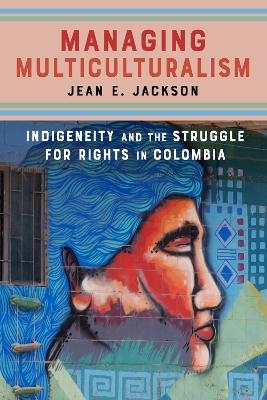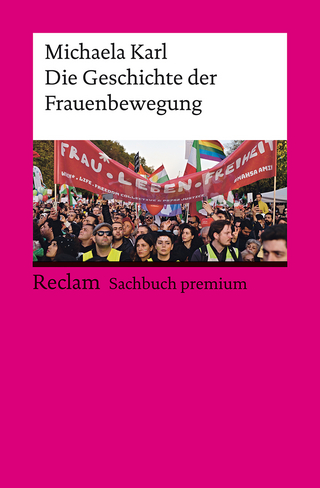
Managing Multiculturalism
Stanford University Press (Verlag)
978-1-5036-0769-9 (ISBN)
The story of how indigenous organizing began, found its voice, established alliances, and won battles against the government and the Catholic Church has important implications for the indigenous cause internationally and for understanding all manner of rights organizing. Integrating case studies with commentaries on the movement's development, Jackson explores the politicization and deployment of multiculturalism, indigenous identity, and neoliberalism, as well as changing conceptions of cultural value and authenticity—including issues such as patrimony, heritage, and ethnic tourism. Both ethnography and recent history of the Latin American indigenous movement, this works traces the ideas motivating indigenous movements in regional and global relief, and with unprecedented breadth and depth.
Jean E. Jackson is Professor Emerita of Anthropology at Massachusetts Institute of Technology. Her books include Indigenous Movements, Self-Representation and the State in Latin America (2002), co-edited with Kay B. Warren, and "Camp Pain": Talking with Chronic Pain Patients (2000).
Contents and AbstractsIntroduction: chapter abstractThe introductory chapter presents the book's rationale: an exploration of indigeneity in Colombia, in particular how and why the indigenous movement was able to accomplish so much, especially with respect to territorial rights-claiming, given that indigenous people constitute only a small part of the national population. A brief history of indigenous activism in Latin America is provided, followed by a brief presentation of Colombia's history vis-à-vis its indigenous communities. The armed conflict is discussed, along with the development of official multiculturalism, constitutional reform, and changing notions of citizenship and of the state itself. The discussion then moves to an introduction to the author's five decades of ethnographic research in the country. Definitions of key terms follow (multiculturalism, neoliberalism, identity, culture, and indigeneity), and an outline of the chapters.
1Indigenous Colombia chapter abstractThis chapter begins with a brief history of indigenous organizing in Colombia, followed by discussion of the shift to official multiculturalism during the 1980s, which culminated in the 1991 constitution. The significance of constitutional reform for the country's indigenous communities, which reversed decades of assimilationist policies, greatly strengthened customary law (legal pluralism, also known as special jurisdiction), and promoted legislation that eventually handed over almost 30 percent of national territory to the country's indigenous communities, is discussed. Changing notions of citizenship are also examined, along with the crucial role of two new institutions, the Constitutional Court and the Acción de Tutela, a writ for the immediate protection of constitutional rights. A brief introduction to the country's Afro-Colombians, along with an examination of official recognition of rights for Black communities as compared to those for indigenous communities, concludes the chapter.
2Tukanoan Culture and the Issue of "Culture" chapter abstractThis chapter examines the challenges to anthropological theories of culture posed by political organizing around cultural and ethnic rights. The evolution of the Regional Indigenous Council of the Vaupés, CRIVA, illustrates many of the difficulties activists (and NGOs and state functionaries) encounter when they deploy culture for political ends. Jackson also touches on postmodern questions about authorial reflexivity and ethnographic representation in an account of her search for an analytic approach that would avoid giving the impression that she was judging CRIVA's representations of Tukanoan culture in an entirely negative manner. The chapter explores the question of how to conduct research on these sensitive topics without inciting opprobrium in research communities, as well as in the larger activist and scholarly communities.
3The State's Presence in the Vaupés Increases chapter abstractThis chapter examines local implementation of national multiculturalist policies in the Vaupés (Northwest Amazon), a previously neglected region that has experienced a significant increase in national and international interest because of its high proportion of indigenous inhabitants. The chapter first discusses the shifting status of the hunter-gatherer people known as Nukak, a change due to their newly valorized identity as authentic, radically indigenous Others, as well as the impact of new discourses of equality and indigenous brotherhood that were entering the region. The chapter discusses the consequences of the differential degrees of indigenousness attributed to the Nukak and two other pueblos living in neighboring Guaviare, contradicting the state's assumption that all native communities are equally indigenous.
4The Indigenous Movement and Rights chapter abstractThis chapter begins by describing a nationwide crisis in which indigenous activists occupied numerous government offices throughout Colombia, which revealed pressures on the indigenous movement to move from a discourse of generic indigenous militancy to one of rights-claiming based on culture-specific difference and traditional leadership. The chapter then discusses examples of clashes between Western criminal law and indigenous communities' traditions concerning judging, sentencing, and punishing wrongdoers, a result of the constitution's recognition of the special indigenous jurisdiction. These examples highlight the complexities of legal pluralism and the need to examine how a community either rejects or revises and adopts human rights discourses.
5Reindigenization and Its Discontents chapter abstractThis chapter discusses several communities working to recover their indigenous identity—a process known as reindigenization. Unlike many classes of people claiming rights whose membership in their class is fairly straightforward (e.g., women), people claiming indigenous rights may be challenged as not indigenous, or not indigenous enough. Given the Colombian constitution's lack of criteria for determining indigenousness and the ever-increasing volume of petitions requesting official recognition, the government has issued ever-more stringent requirements. Established communities also resisted reindigenizing projects, illustrating how, as indigenousness becomes associated with cultural and political capital, its boundaries become more closely policed. The chapter also discusses the links between indigeneity and heritage, patrimony, and marketing discourses, in particular UNESCO's notion of intangible heritage, as well as urban reindigenization efforts in two communities that self-identify as Muisca. These cases shed light on the issue of authenticity, in particular the role of anthropologists as authenticators.
Conclusion: Indigeneity's Ironies and Contradictions chapter abstractThis concluding chapter reviews the book's major points, one of them being what the Colombian case, with its small minority of indigenous citizens, can contribute to the literature on Latin American indigenous movements. Other points reviewed include the circularity inescapable in the cultural politics of indigeneity, in which culture is a right but also a site from which to claim rights; notions of authentic indigeneity, especially with respect to reindigenization; state multiculturalism and the consequences of constitutional reform; the role of broad national support for indigenous rights; Colombia's version of legal pluralism; the evolution of conceptions of cultural value and authenticity; public perceptions of indigenous communities, activists, and issues; stereotypes of indigeneity; ethnographic ethics; and the role of anthropologists as arbiters of authentic indigenous culture (who qualifies as indigenous, and who gets to decide?).
| Erscheinungsdatum | 18.01.2019 |
|---|---|
| Zusatzinfo | 18 halftones, 2 maps |
| Verlagsort | Palo Alto |
| Sprache | englisch |
| Maße | 152 x 229 mm |
| Themenwelt | Sachbuch/Ratgeber ► Geschichte / Politik ► Allgemeines / Lexika |
| Geisteswissenschaften ► Geschichte ► Regional- / Ländergeschichte | |
| Sozialwissenschaften ► Ethnologie | |
| Sozialwissenschaften ► Politik / Verwaltung | |
| Sozialwissenschaften ► Soziologie | |
| ISBN-10 | 1-5036-0769-0 / 1503607690 |
| ISBN-13 | 978-1-5036-0769-9 / 9781503607699 |
| Zustand | Neuware |
| Haben Sie eine Frage zum Produkt? |
aus dem Bereich


